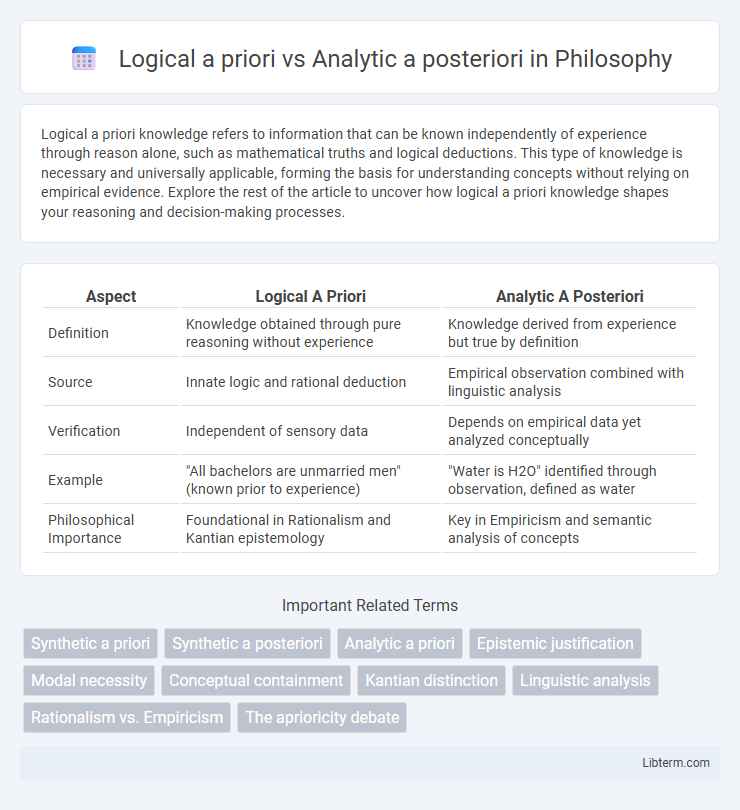Logical a priori knowledge refers to information that can be known independently of experience through reason alone, such as mathematical truths and logical deductions. This type of knowledge is necessary and universally applicable, forming the basis for understanding concepts without relying on empirical evidence. Explore the rest of the article to uncover how logical a priori knowledge shapes your reasoning and decision-making processes.
Table of Comparison
| Aspect | Logical A Priori | Analytic A Posteriori |
|---|---|---|
| Definition | Knowledge obtained through pure reasoning without experience | Knowledge derived from experience but true by definition |
| Source | Innate logic and rational deduction | Empirical observation combined with linguistic analysis |
| Verification | Independent of sensory data | Depends on empirical data yet analyzed conceptually |
| Example | "All bachelors are unmarried men" (known prior to experience) | "Water is H2O" identified through observation, defined as water |
| Philosophical Importance | Foundational in Rationalism and Kantian epistemology | Key in Empiricism and semantic analysis of concepts |
Defining Logical A Priori: Foundations and Features
Logical a priori knowledge is grounded in necessary truths that are independent of empirical experience, relying solely on reason and formal logic. Its foundations lie in the inherent structure of concepts and definitions, allowing for judgments that are universally valid and certain prior to any observation. Key features include necessity, universality, and the ability to be known through reflection alone, distinguishing it from analytic a posteriori knowledge which depends on empirical confirmation.
Understanding Analytic A Posteriori: Conceptual Clarifications
Analytic a posteriori knowledge involves truths that are known through experience but are analytically true based on the meanings of the concepts involved, challenging the traditional Kantian division between analytic a priori and synthetic a posteriori. This concept requires distinguishing between statements whose truth depends on empirical verification and those that are true by definition yet only identifiable after experience. Understanding analytic a posteriori clarifies the boundaries of epistemology and semantics, emphasizing how conceptual analysis can intersect with empirical evidence.
Historical Context: Philosophers on A Priori and A Posteriori Knowledge
Immanuel Kant played a pivotal role in distinguishing logical a priori knowledge, which is necessarily true and independent of experience, from analytic a posteriori knowledge, traditionally considered impossible since analytic truths rely solely on meanings. Earlier philosophers like David Hume emphasized a posteriori knowledge based on empirical observation, challenging the certainty of a priori claims. Kant's "Critique of Pure Reason" redefined epistemology by asserting that synthetic a priori judgments are possible, bridging the historical gap between purely analytic a priori and empirical a posteriori knowledge.
Logical A Priori in Modern Epistemology
Logical a priori knowledge in modern epistemology refers to propositions that are necessarily true independent of empirical experience, grounded in reason and logical form. This type of knowledge is characterized by its necessity and universality, such as mathematical truths and tautologies, which are justified through intellectual insight rather than sensory data. Contemporary discussions emphasize its role in providing foundational certainty and shaping conceptual frameworks within analytic philosophy and cognitive science.
Analytic A Posteriori: Rare or Possible?
Analytic a posteriori knowledge, traditionally considered rare due to the analytic-synthetic distinction, challenges classical epistemology by combining necessity and empirical verification. Philosophers like Hilary Putnam argue for its possibility through examples such as "Water is H2O," which is both analytically true and known a posteriori. This blurs the strict boundaries between analytic a priori and synthetic a posteriori categories, suggesting a more nuanced understanding of knowledge types.
Key Criteria: Distinguishing Analytic and Logical Judgments
Logical a priori judgments are characterized by their necessity and universality, grounded in pure reason without reliance on empirical evidence. Analytic a posteriori judgments, though less common, involve statements that are true by definition but require empirical investigation to confirm their applicability. The key criteria distinguishing analytic and logical judgments hinge on their dependence on meaning alone versus their reliance on both meaning and experiential data.
Case Studies: Examples of Logical A Priori Judgments
Logical a priori judgments are statements known independently of experience, such as "All bachelors are unmarried," which are true by definition and rooted in their logical structure. Case studies in this area often analyze mathematical truths or tautologies, where knowledge arises from reason alone without empirical evidence. These judgments demonstrate the necessity and universality characteristic of logical a priori knowledge, distinguishing them from analytic a posteriori insights that rely on observed data.
Analytical Judgments from Experience: Possible Scenarios
Analytical judgments traditionally based on a priori reasoning can, in some scenarios, be informed by empirical data, blurring the distinction between logical a priori and analytic a posteriori knowledge. For instance, in mathematics applied to physical sciences, certain truths derived analytically must be tested and confirmed through observation to ensure their applicability. Such cases illustrate how experience may impact the validation of what is analytically considered necessary, emphasizing the dynamic relationship between logic and empirical evidence.
Philosophical Debates: Challenges and Counterarguments
Logical a priori knowledge is traditionally understood as knowledge independent of experience, grounded in necessity and analyticity, while analytic a posteriori challenges this by arguing some truths, despite being analytic, require empirical input. Philosophical debates center on the validity of Kantian distinctions, with counterarguments highlighting cases like Godel's incompleteness theorems and Quine's critique of the analytic-synthetic divide, undermining the neat categorization of knowledge. These challenges prompt reexaminations of epistemic frameworks and stress the fluid boundaries between a priori insight and empirical validation.
Implications for Philosophy of Language and Logic
Logical a priori knowledge, grounded in necessary truths independent of experience, establishes foundational principles for formal logic and language structures, whereas analytic a posteriori truths, derived from empirical verification yet semantically true by definition, challenge traditional boundaries of analytic-synthetic distinction. This interplay influences debates on semantic theory, emphasizing how meaning and truth conditions relate to linguistic conventions and cognitive patterns. Consequently, the philosophy of language and logic must reconcile the stability of logical constants with the fluidity of empirical content in semantic analysis.
Logical a priori Infographic

 libterm.com
libterm.com